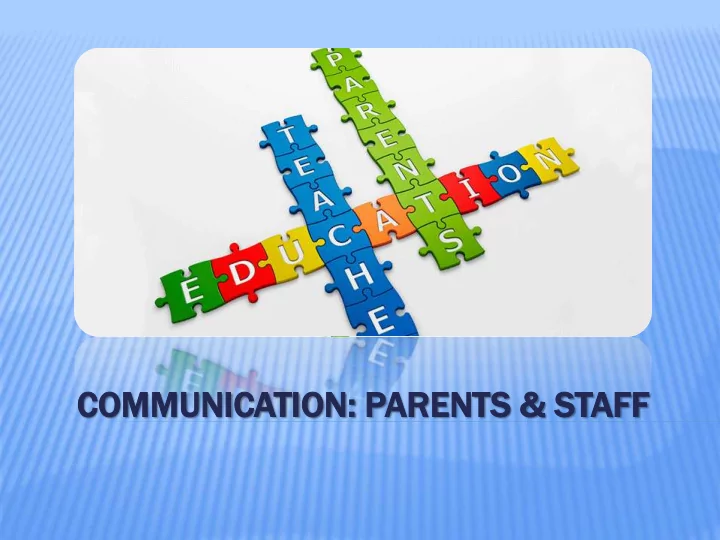

COM OMMUNIC MUNICATION: ION: PARENT ENTS S & ST STAFF FF
IDENTIFY THE ISSUE Acade demic ic – one class? Multiple classes? Learning issues? History of poor performance? Behavio vioral ral – history? Isolated incident? Environmental factors? Emotional ional – How does it manifest? When does it arise? What are the signs? Contact tact teache her? r? Contact tact all l teache hers? Co Contact tact guidan idance e counselor? unselor? Contact tact admini minist strati ration? on?
BEFORE CONTACT Investi estigat gate e the e cl clas ass Know the teacher policies & procedures, grade categories, expectations, etc. (see ee sylla llabu bus) Fami mily ly Acc cces ess Give adequate time to see grades (multiple essays take longer than mc Gradecam quizzes) Updating varies but only mandated 2x a trimester Asterisk is NOT missing or 0%; simply not entered yet AB = absent & awaiting update MS or 0% = not submitted Scores: know the overall amount, not just the % Is it 3/5 or 30/50
PROACTIVE BEATS REACTIVE Teacher contact information in phones, email, on refrigerators, etc. Bookmark websites Check in with your child Regular communication about current curriculum & planning Basic studying methods flashcards still work! Don’t procrastinate Grades after quizzes/tests/projects = done THEY demonstrate Checking the website Organized binder Regular use of planners Specific studying area
TIME TO ACT Don’t ignore your Spidy dy sen ense se an and mo model del co comm mmunication unication met methods hods Email first Appointment to meet Follow up communication Show your child how appropriately and get them involved. Child should always attend meetings. (Less loopholes, more empowerment.)
AGENDA & OBJECTIVES Have e sp spec ecif ific ic goals s for your r me meeti eting ng. Now that the problem is targeted, what is the goal? Give e time for us s to prepare are our r informa rmation tion Ask the teacher what they’ve seen/heard in class (If behavior, ask for specifics & how they differ from others; if academic, ask to compare to expectation). Ask for evide dence nce to support teacher observations. Bring ing your informat ormation ion Explain what you see or have heard. Show evidence ence if you have it available. Tell us what you would like to see or what you need help with. Ask for strategies or tips. OFFER what works at home. Resp spect the time If it’s more than an email, ask when a good time to talk/meet is – drop-ins are very difficult for us.
PLANNING IS KEY Goals ls mu must be be re reasonable onable, , re realist listic, ic, speci ecific ic & measurable me surable. Cre reat ate e a p pla lan n for r cl class ss Cre reat ate e a p pla lan n for r home me everyone knows how this will be monitored outside of class (key to kids being involved in the process). Make e a co comm mmunica unication tion pla lan n with h ch child ld to check in on those goals. Encourage growth & hold them accountable. Conti ntinue nue co comm mmunica unication tion - Agree to follow up with teacher when & how
SOMETIMES IT’S HOW YOU SAY IT Assum ume e be best t int ntent ent (We may have a different method than you would use but our goals are for your child’s success.) St Stay ca calm lm. . Yelling, insulting, accusing, patronizing, etc. are immediate turn-offs. After the meeting your child needs to be with that teacher for the rest of the year. Ask for r a me medi diat ator or – Please communicate with us first but if you don’t feel like things are not progressing, ask for help through Guidance Counselors or Administration.
ALSO GOOD TO KNOW GOING IN - Assess essment ments/ s/as assi signme gnments nts show understanding of previous content, not constructed as a response to student performance on the previous one. Ho Honor nors s is self lf-sele select ct – be prepared to do more faster. Special ecial Education/ELL/ ucation/ELL/504 504 plans ans - Know your student’s accommodations & make sure you & they know what those look like. Extra credit is unlikely; focus cus on work available ailable. Packets while on an impromptu vacation vacation are very unlikely (and often unproductive anyway). Extracurricular tracurricular activi ivities ies are optional, not mandatory. If they interfere with academics either re-evaluate the involvement or create a strict plan to do both well. Attendance endance is key.
ARTICLES TO EXTEND THINKING The Smart t Way to Talk k to Teach chers ers hers/ – Pa Parents ts.com com http://w //www ww.p .par aren ents. s.com om/ki /kids/e /edu ducatio ation/ba /back-to to-sc schoo hool/ l/ho how-to to-talk talk-to to-teac achers Situa uations ons and sugges estions ons for respond onding ng Conversation Starters to Use With Your Child’s Teacher chers – https:/ ://ww www.u .underst derstood ood.or .org/e /en/s /school hool-le lear arnin ing/p /par artner erin ing-with th-chi hild lds-schoo hool/w l/worki king-with ith-childs ilds- teac acher/c her/con onversa satio ion-star starter ers-to to-use se-wi with th-your our-child ilds-tea eachers hers Under Un erst stood. ood.or org Everything ng from behaviora oral l issues s to academic c conc ncer erns ns 10 Things You Should Never Say to Your Kids’ Teacher http://w tp://www ww.w .womans mansday.c .com/ m/re relati tions nships hips/f /famil mily-frie friends nds/g695 g695/n /never er-sa say-child hilds-teache cher/ – Woman’s Day Of the 10, I h have experie rience nced d all of them and more. . Not otice ce how qu quick ck fixes s can change ge all of these easily y to be more posi sitive e & p produc ductive. .
DON’T LOS OSE SI SIGHT HT OF OF THE HE OB OBJE JECTIVE CTIVE
Recommend
More recommend